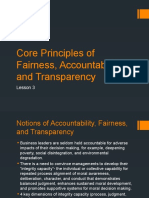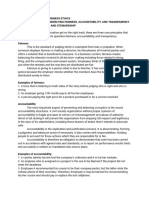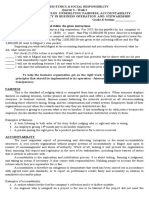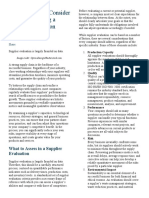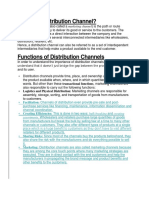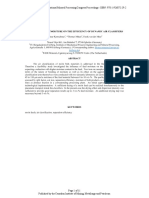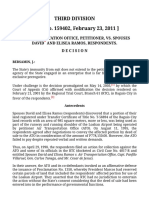LESSON 3: Core Principles of Fairness, Accountability, and Transparency
Accountability: What It Is
To be accountable is to be liable to explain or justify one’s actions and decisions.
Accountability is the process of explanation and justification.
Holding to account is the process of requiring explanation and justification, but it is also about testing, forming a judgment, and if necessary, taking
action.
Accountability implies responsibility: it is reasonable only to hold people to account for those things for which they are responsible.
It is not synonymous with responsibility.
It is not the same as appraisal.
It is not about confrontation, “putting someone in his/her place” or “giving him/her a hard time.”
Sound accountability structures are the most important aspect of prevention and detection of corruption.
A civil society organization without proper accountability systems is fragile and open to rumors about mismanagement and abuse of power.
Worst of all, it will prevent it from enjoying respect and full legitimacy in the eyes of its stakeholders including those duty bearers whom it intends to
engage with advocacy.
Accountability is the obligation to demonstrate that work has been conducted in compliance with agreed rules and standards or to report fairly and
accurately on performance results vis-à-vis mandated roles and/or plans.
Fairness involves balancing the interests involved in all decision-making including any decisions related to hiring, firing (including the investigatory
process), and the compensation and rewards system.
Overall, fairness has to do with justice, which is to give to another that which is due him or her. More concretely, justice: (1) looks at the balance of benefits
and burdens distributed among members of a group; and/or (2) can result from the application of rules, policies, or laws that apply to a society or a group.
In general, the just results of actions override utilitarian results.
On the organizational level, the instrumental salience of transparency is referred to in two instances (Caritas in Veritate (CV) 47, 65). In the first
case (CV 47), transparency is identified as an important mechanism for guaranteeing social accountability. The discussion is focused on the role
that transparency plays in international and nongovernment organizations (NGOs) working in humanitarian projects.
This understanding of transparency as a means for organizational accountability is consistent with previous Catholic Social Thought (CST)
documents. Appropriate information disclosure, such as the percentage of funds directly used to help people, the activities and the results
� achieved, and how these organizations’ budgets are distributed among different organizational functions, is necessary to inform donors about how
their money is used by these organizations.
Transparency allows stakeholders to understand whether the activities of social institutions, such as international organizations and NGOs,
provide a genuine service to civil society and whether money is used appropriately.
Minimum Competencies Expected of Professionals
1.
They encompass the ability to apply specialized knowledge or expertise, both that which is learned through extensive formal education and that which is
developed on the job.
The first and most basic necessary skill for a working professional is solid competence in the human sphere, in the sphere of work.
Such competence requires the following characteristics: (a) human maturity—a person works not only hard and solidly but also efficiently, that is, with
professionalism; and (b) work is done in a spirit of service and love for those around us (social dimension of the work).
2.
These pertain to the ability to understand, communicate with, motivate, and support other people, both individually and in groups, which defines human
skills.
The working professional also needs “relational intelligence (RI)” in order to connect and interact effectively and respectfully with people and stakeholders
from various backgrounds, diverse cultures, and with different interests, inside and outside the organization, and to build lasting and trustful relationships.
RI is based on a combination of emotional intelligence and “ethical intelligence.”
3.
These are the skills and the mental ability that managers must have to analyze and diagnose complex situations.
Commercial viability and long-term business success depend on the ability of a firm and their leadership to act responsibly with respect to all
stakeholders in business, society, and the environment.
Responsibility here means to make sure that the company’s products and services meet the needs of the customers and clients, that they are safe
and not harmful, and that real and potential risks are openly and transparently communicated.
Part of the responsibility of the worker is to be trustworthy.
Businesses also support the well-being of members of society through their other key functions.
�They go beyond their own self-interest and focus on opportunities to help followers grow and develop.
They do not use power to achieve ends. Instead, they emphasize persuasion.
Their characteristic behaviors include listening, empathizing, persuading, accepting stewardship, and actively developing followers’ potential.
One study found it has resulted in higher levels of commitment to the supervisor, self-efficacy, and perceptions of justice, which all were related to
organizational citizenship behavior (OCB).
It increases team potency (a belief that one’s team has above-average skills and abilities), which in turn leads to higher levels of group performance.
Another study has found higher levels of citizenship associated with a focus on growth and advancement, which in turn was associated with higher levels
of creative performance.
They teach managers about the legal framework for equal employment opportunity and encourage fair treatment of all people regardless of their
demographic characteristics.
1. They teach managers how a diverse workforce will be better able to serve a diverse market of customers and clients.
2. They foster personal development practices that bring out the skills and abilities of all workers, acknowledging how differences in perspective can
be a valuable way to improve performance for everyone.
1. Firms employing more women managers have probably done a better job of recruiting capable managers from the total available talent pool, and
consequently will be in a better position to link with customers, employees, and other constituencies.
2. Firms having a higher proportion of women serving on their boards do engage in charitable giving to a greater extent than firms having a lower
proportion of women serving on their boards.
3. Investors (in Singapore) value the diversity and potential contribution of women on the board of directors, that is, the appointment of female
directors may be viewed as a means of improving corporate governance of firms whose boards may be dominated by old-boys networks, besides
adding to the diversity of corporate boards.
4. Since women represent a significant proportion of the customer base in many corporations, the presence of female directors would bring the
female perspective to the boardroom and positively impact the bottom-line of companies, as explained by evidence that male CEOs find the
viewpoints of female directors beneficial in understanding female clients.






